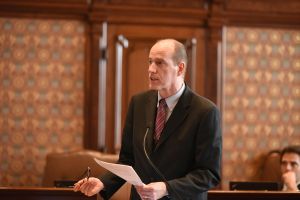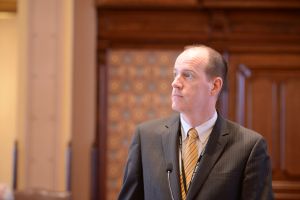- Details
- Category: Latest
 SPRINGFIELD – State Senator Bill Cunningham (D-Chicago) had the following statement after votes being taken on a property tax freeze.
SPRINGFIELD – State Senator Bill Cunningham (D-Chicago) had the following statement after votes being taken on a property tax freeze.
“The Illinois Senate has voted to deliver much needed property tax relief to homeowners throughout the state,” Cunningham said. “This is another step the Senate has taken to make a serious attempt to end the impasse by passing a balanced budget and significant reforms that protect working families.”
- Details
- Category: Press Releases
 SPRINGFIELD – Custody of defendants with mental health issues could become more streamlined and appropriate due to legislation that passed the Illinois Senate on Monday.
SPRINGFIELD – Custody of defendants with mental health issues could become more streamlined and appropriate due to legislation that passed the Illinois Senate on Monday.
“We need to provide the necessary resources to ensure the mental health of those determined to be unfit to stand trial or not guilty by reason of insanity be dealt with appropriately,” said State Senator Bill Cunningham (D-Chicago). “It will only help to keep our communities safer in the long run.”
The legislation, House Bill 649, would create a formal process for the county sheriff and the Department of Human Services to handle custody of defendants found unfit to stand trial or not guilty by reason of insanity. It provides requirements regarding the evaluation and transportation of the defendant to a secure facility.
The legislation now moves to the governor’s desk for approval.
- Details
- Category: Press Releases
 SPRINGFIELD – State Senator Bill Cunningham had the following response to the votes taken today on the ‘Grand Bargain’ legislation.
SPRINGFIELD – State Senator Bill Cunningham had the following response to the votes taken today on the ‘Grand Bargain’ legislation.
“We have tried again and again to achieve a bipartisan compromise that would help put Illinois’ fiscal house in order and the governor has once again blocked progress,” Cunningham said. “He keeps saying were close. Well, close is not good enough for the MAP grant recipient who may not be able to attend Moraine Valley next semester. Illinois needs decisive action, not more talk about being close.”
Senator Cunningham continues to work toward properly funding higher education and ensuring MAP grants are funded both for the current fiscal year and next year.
- Details
- Category: Press Releases
 SPRINGFIELD – People committing repeat violent offenses could soon be denied bail by bond court judges under legislation passed by the Illinois Senate on Friday.
SPRINGFIELD – People committing repeat violent offenses could soon be denied bail by bond court judges under legislation passed by the Illinois Senate on Friday.
“What we are seeing is that many people who commit some of these gun crimes find a way to post bond relatively quickly. One place where that shouldn’t be allowed is if you commit the crime in a place where children may be present,” State Senator Bill Cunningham (D-Chicago) said.
The measure, Senate Bill 1980, was an initiative of Cook County Sheriff Tom Dart. It would not allow bail to be set if proof is evident or the presumption of guilt is so great that a significant gun crime was committed and that the defendant presents a real and present threat to the safety of any individual.
“Given the spike of gun crimes in Chicago, we need to give judges the tools they need to stop the revolving door of violent offenders who cycle in and out of jail,” Cunningham said.
Some of the gun crimes included are aggravated discharge of a firearm with a silencer, aggravated unlawful use of a weapon, armed habitual criminal or unlawful possession of a firearm by individuals convicted of a violent offense.
More Articles …
Page 56 of 86



